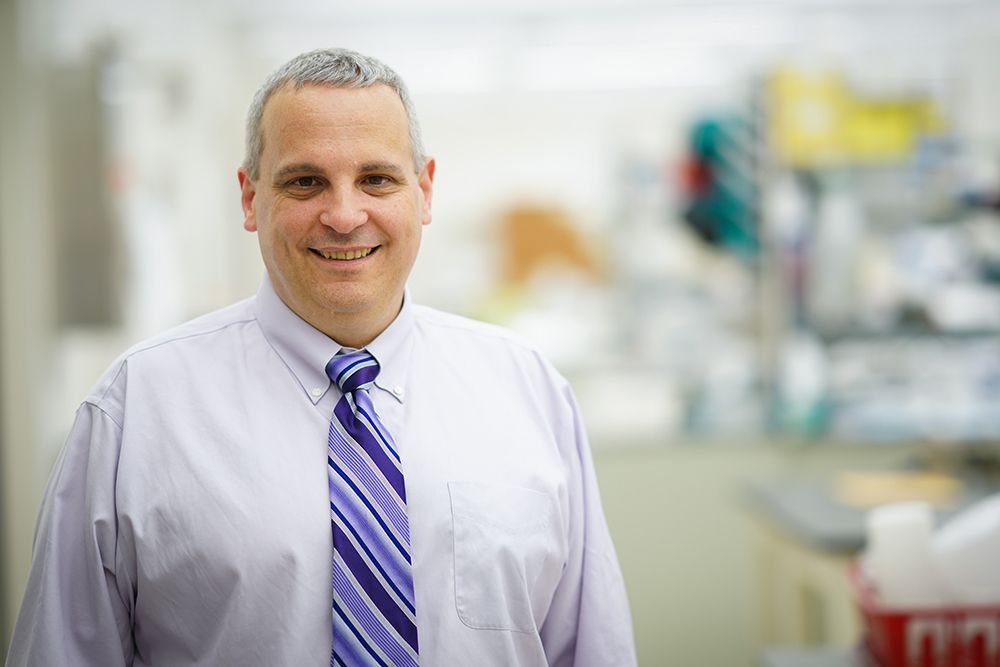Immune system plays important role in cancer prevention, Roswell Park-led research reveals
- Team found higher risk of some cancers in patients with immune deficiency
- Strongest association was with lymphoma
- Immune system has restricted role in cancer surveillance and prevention
BUFFALO, N.Y. — Primary immunodeficiency diseases (PIDD) are a group of more than 300 disorders caused by single-gene defects that prevent the immune system from functioning properly. These immune disorders affect 1 in 1,200 people, and an association between these diseases and cancer has been noted. A team of researchers at Roswell Park Comprehensive Cancer Center recently found an increased incidence of certain types of cancer, particularly lymphoma, in patients with PIDD. Their findings, published online ahead of print in the Journal of Allergy and Clinical Immunology, reveal a restricted but important role for the immune system in protecting against certain types of cancer.
The Roswell Park investigators evaluated the incidence of cancer among patients with PIDD registered in the United States Immune Deficiency Network (USIDNET). This registry, the largest of its kind, is a research program of the Immune Deficiency Foundation that gathers information regarding the history and outcomes of patients with PIDD. The study compared rates of cancer in USIDNET patients with those for the general population using data from the Surveillance, Epidemiology and End Results Program (SEER) of the National Cancer Institute, a population-based registry collecting cancer data throughout the United States. They compared overall and site-specific rates of cancer in 3,658 PIDD patients and an age-adjusted SEER population, making this the largest study of its kind.
The team found a 42% increase in overall cancer incidence among patients with PIDD. The majority of cancers (70%) were noted in patients with common variable immunodeficiency (CVID), followed by hypogammaglobulinemia and agammaglobulinemia (9%) and Wiskott-Aldrich syndrome (4.6%). The cancer types with the highest incidence rates among PIDD patients in the USIDNET registry were lymphoma, skin cancer and thyroid cancer.
The researchers found that incidence of lymphoma was 10 times higher among men and 8 times higher among women, and concluded that this excessive lymphoma risk was largely driven by CVID. Compared with the general population, men with PIDD were more likely to be diagnosed with skin and thyroid cancer, whereas women with PIDD were more likely to be diagnosed with skin and stomach cancer. Patients with PIDD did not have increased incidence of the most common types of solid tumors: lung, breast, colon and prostate.
“We found that patients with primary immunodeficiency have a modest but significant increase in the overall incidence of cancer. Although we did not observe an increased risk of the most common solid-tumor malignancies, we did find that patients with specific forms of primary immunodeficiency diseases are predisposed to certain types of cancers,” says senior author Brahm Segal, MD, Chief of Infectious Diseases and Member of the Department of Immunology at Roswell Park. “Cancers observed with higher frequency in patients with PIDD were generally associated with an infectious cause, such as Epstein-Barr virus-associated lymphoma. Our results point to a restricted role of the immune system in protecting against specific cancers, and underscore the need for evidence-based approaches for early detection in high-risk PIDD patients.”
“One of the many functions of the immune system is to recognize and eliminate cancerous or precancerous cells in the body in order to prevent cancer from developing,” adds first author Paul Mayor, MD, MS, Fellow in Roswell Park’s Department of Gynecologic Oncology. “Our study demonstrates that patients with primary immunodeficiency diseases have an increased risk of certain cancers, which adds to our understanding of the role of the immune system and immunosurveillance in the risk of cancer among those with a compromised immune system.”
The study, “Cancer in primary immunodeficiency diseases: Cancer incidence in the United States Immune Deficiency Network Registry,” is available at sciencedirect.com.
This work was supported by Roswell Park Comprehensive Cancer Center’s Cancer Center Support Grant from the National Cancer Institute, or NCI (project no. P30CA016056), several other grants from the NCI or other National Institutes of Health agencies (project nos. T32CA108456, K01LM012100, T32CA085183, R01CA140622, P50CA159981 and R01CA188900) and an award from the United States Immunodeficiency Network and Immune Deficiency Foundation (U24AI086037-06).
###
The mission of Roswell Park Comprehensive Cancer Center is to understand, prevent and cure cancer. Founded in 1898, Roswell Park is one of the first cancer centers in the country to be named a National Cancer Institute-designated comprehensive cancer center and remains the only facility with this designation in Upstate New York. The Institute is a member of the prestigious National Comprehensive Cancer Network, an alliance of the nation’s leading cancer centers; maintains affiliate sites; and is a partner in national and international collaborative programs. For more information, visit www.roswellpark.org, call 1-877-ASK-Roswell Park (1-866-559-4838) or email AskRoswell@Roswellpark.org. Follow Roswell Park on Facebook and Twitter.
Annie Deck-Miller, Senior Media Relations Manager
716-845-8593; annie.deck-miller@roswellpark.org

